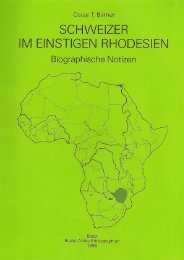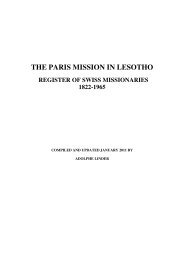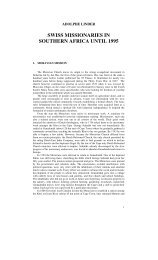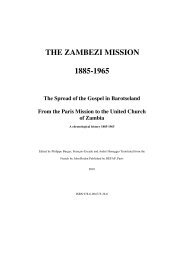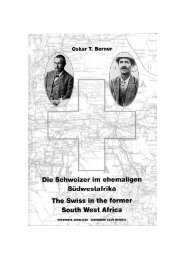THE SWISS IN SOUTHERN AFRICA 1652-1970 - swissroots-za.ch
THE SWISS IN SOUTHERN AFRICA 1652-1970 - swissroots-za.ch
THE SWISS IN SOUTHERN AFRICA 1652-1970 - swissroots-za.ch
Create successful ePaper yourself
Turn your PDF publications into a flip-book with our unique Google optimized e-Paper software.
therein by his friend Bernardus La Fontaine (a Fren<strong>ch</strong>man by trade a tailor) both of<br />
them threatening the Deputy in a most violent and brutal manner. With clen<strong>ch</strong>ed fists<br />
held in his face, they told him he would proceed with the sale at the expense of his arms<br />
and legs whi<strong>ch</strong> they would break. La Fontaine also threatenend to use a sjambok (whip<br />
made of hide) on him, while Orffer ran about in an outrageous and distracted manner,<br />
repeating his threats to Spasie that he would kill her of she appeared. Their language<br />
throughout was outrageous, calling the Deputy a vagabond and thief and many names<br />
whi<strong>ch</strong> could not be repeated.<br />
Both were arrested for resisting the law and pleaded guilty in court. La Fontaine<br />
declared he was drunk and did not know what he was doing – he realized only the next<br />
day, when told, what had happened. Orffer pleaded that he too had had too mu<strong>ch</strong> wine –<br />
this and the sorrow that his creditors must lose so mu<strong>ch</strong> money had made him<br />
completely intoxicated. They were found guilty to short terms in prison at Worcester.<br />
Orffer immediately petitioned to serve his term in the Cape Town goal, whi<strong>ch</strong> was<br />
granted. 8 There. a month later, he submitted a second petition requesting remission of<br />
his remaining period of confinement. This was turned down on the grounds that one<br />
petition had already been granted and that in any case, his sentence was very lenient. 9<br />
In the meantime his wife Susanna, having lost all her possessions accumulated over<br />
ten years of hard work, and with her husband in prison, returned to her widowed mother<br />
living on the farm of Jnr. S<strong>ch</strong>olz at Paardeberg. There Orffer joined her and the <strong>ch</strong>ildren<br />
after his release, a broken old man at the age of 56, and there he died a year later 10<br />
survived by the three <strong>ch</strong>ildren:<br />
1. Christiaan Johannes born 20.1.1822 married at Daljosafat, Wellington 22.8.1854,<br />
Maria Susanna Retief . In 1883 both he and his son Christiaan Johannes as well as<br />
Frederik, son of Frederik Furter of Basel and his son farmed on Vondeling at<br />
Twenty-Four River near Gouda. 11<br />
2. Dirk Roeloff born 22.2.1826.<br />
3. Maria Catharina born 28.9.1827.<br />
/ 1 KAB, BO 195-6; 2 Cape Almanac 1811, p. 14; 1813, p. 14; 3 Cape Almanac, 1812-<br />
1816, always p. 19; 4 KAB, J 41; 5 KAB, CO 4316, 18.2.1814; 6 KAB, 1/STB/22/34:<br />
Huweliksnotulen, 4.12.1819; 7 KAB, 1/WOC 2/15 Preparatory Examination 12.1.1829;<br />
8 KAB, CO 4323: 516, 2.3.1829; 9 KAB, CO 4323:638, 28.3.1829; 10 KAB, J 296 and<br />
1/STB/16/148; 11 South African Directory, 1883/4.<br />
Concord, L. of Neu<strong>ch</strong>atel, about 1802 visited the Lodge Goede Trouw at 18 Plein<br />
Street, Cape Town. / Griesba<strong>ch</strong>, F.T.R.: A History of the Lodge de Goede Trouw, No.<br />
26, p. 11.<br />
Habluetzel, Johannes Jakob born Trüllikon<br />
ZH 24.10.1779, son of Johann Heinri<strong>ch</strong><br />
Hablützel and Elisabeth born Runger. 1<br />
Arrived 1802 with the Batavian troops<br />
reoccupying the Cape. On 29.6.1802 he was<br />
appointed Second Surgeon’s Mate (2 nd<br />
Surgeon) and served at the Great Military<br />
Hospital. 2 At the second British occupation of<br />
the Cape he took service with the British<br />
without first obtaining his dis<strong>ch</strong>arge from the<br />
Batavian troops for whi<strong>ch</strong> the departing<br />
Governor, Geneal Janssens, branded him a<br />
deserter with aggravating circumstances. 3<br />
Habluetzel obtained permission from the<br />
British to remain at the Cape 4 and initially<br />
made his living as a surgeon. In his<br />
hometown Trüllikon Habluetzel had been<br />
described as an engineer. 5 When, in 1807 the<br />
British regulated the medical profession at<br />
the Cape, Habluetzel could neither show a<br />
medical diploma nor was he ready to be examined by the newly constituted medical<br />
113



